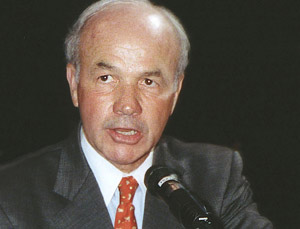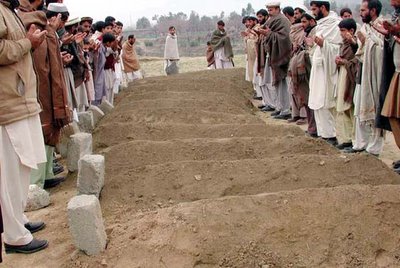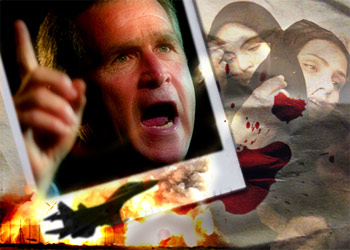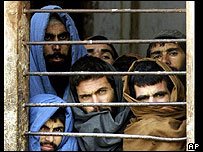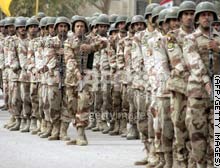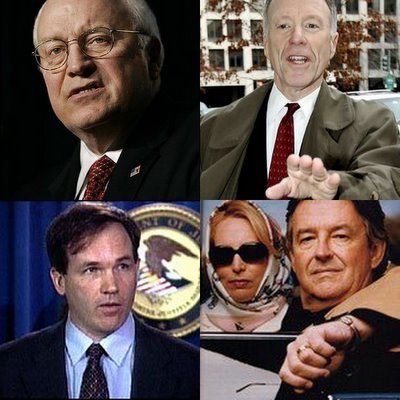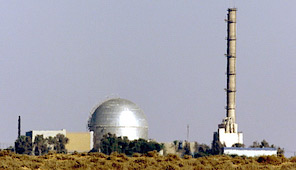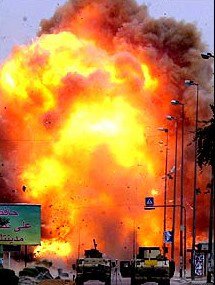Dahr Jamail's Iraq Dispatches
February 24, 2006
The most important question to ask regarding the bombings of the Golden
Mosque in Samarra on the 22nd is: who benefits?
Prior to asking this question, let us note the timing of the bombing.
The last weeks in Iraq have been a PR disaster for the occupiers.
First, the negative publicity of the video of British soldiers beating
and abusing young Iraqis has generated a backlash for British occupation
forces they’ve yet to face in Iraq.
Indicative of this, Abdul Jabbar Waheed, the head of the Misan
provincial council in southern Iraq, announced his councils’ decision to
lift the immunity British forces have enjoyed, so that the soldiers who
beat the young Iraqis can be tried in Iraqi courts. Former U.S.
proconsul Paul Bremer had issued an order granting all occupation
soldiers and western contractors immunity to Iraqi law when he was head
of the CPA…but this province has now decided to lift that so the British
soldiers can be investigated and tried under Iraqi law.
This deeply meaningful event, if replicated around Iraq, will generate a
huge rift between the occupiers and local governments. A rift which, of
course, the puppet government in Baghdad will be unable to mend.
The other huge event which drew Iraqis into greater solidarity with one
another was more photos and video aired depicting atrocities within Abu
Ghraib at the hands of U.S. occupation forces.
The inherent desecration of Islam and shaming of the Iraqi people shown
in these images enrages all Iraqis.
In a recent press conference, the aforementioned Waheed urged the Brits
to allow members of the provincial committee to visit a local jail to
check on detainees; perhaps Waheed is alarmed as to what their condition
may be after seeing more photos and videos from Abu Ghraib.
Waheed also warned British forces that if they didn’t not comply with
the demands of the council, all British political, security and
reconstruction initiatives will be boycotted.
Basra province has already taken similar steps, and similar machinations
are occurring in Kerbala.
Basra and Misan provinces, for example, refused to raise the cost of
petrol when the puppet government in Baghdad, following orders from the
IMF, decided to recently raise the cost of Iraqi petrol at the pumps
several times last December.
The horrific attack which destroyed much of the Golden Mosque generated
sectarian outrage which led to attacks on over 50 Sunni mosques. Many
Sunni mosques in Baghdad were shot, burnt, or taken over. Three Imans
were killed, along with scores of others in widespread violence.
This is what was shown by western corporate media.
As quickly as these horrible events began, they were called to an end
and replaced by acts of solidarity between Sunni and Shia across Iraq.
This, however, was not shown by western corporate media.
The Sunnis where the first to go to demonstrations of solidarity with
Shia in Samarra, as well as to condemn the mosque bombings.
Demonstrations of solidarity between Sunni and Shia went off over all of
Iraq: in Basra, Diwaniyah, Nasiriyah, Kut, and Salah al-Din.
Thousands of Shia marched shouting anti-American slogans through Sadr
City, the huge Shia slum area of Baghdad, which is home to nearly half
the population of the capital city. Meanwhile, in the primarily Shia
city of Kut, south of Baghdad, thousands marched while shouting slogans
against America and Israel and burning U.S. and Israeli flags.
Baghdad had huge demonstrations of solidarity, following announcements
by several Shia religious leaders not to attack Sunni mosques.
Attacks stopped after these announcements, coupled with those from Sadr,
which I’ll discuss shortly.
Shia cleric Grand Ayatollah Ali Al-Sistani, shortly after the Golden
Mosque was attacked, called for “easing things down and not attacking
any Sunni mosques and shrines,” as Sunni religious authorities called
for a truce and invited everyone to block the way of those trying to
generate a sectarian war.
Sistani’s office issued this statement: “We call upon believers to
express their protest ... through peaceful means. The extent of their
sorrow and shock should not drag them into taking actions that serve the
enemies who have been working to lead Iraq into sectarian strife.”
Shiite religious authority Ayatollah Hussein Ismail al-Sadr warned of
the emergence of a sectarian strife “that terrorists want to ignite
between the Iraqis” by the bombings and said, “The Iraqi Shiite
authority strenuously denied that Sunnis could have done this work.”
He also said, “Of course it is not Sunnis who did this work; it is the
terrorists who are the enemies of the Shiites and Sunni, Muslims and non
Muslims. They are the enemies of all religions; terrorism does not have
a religion.”
He warned against touching any Sunni Mosque, saying, “our Sunni
brothers’ mosques must be protected and we must all stand against
terrorism and sabotage.” He added: ‘The two shrines are located in the
Samarra region, which [is] predominantly Sunni. They have been
protecting, using and guarding the mosques for years, it is not them but
terrorism that targeted the mosques…”
He ruled out the possibility of a civil war while telling a reporter, “I
don’t believe there will a civil or religious war in Iraq; thank God
that our Sunni and Shiite references are urging everyone to not respond
to these terrorist and sabotage acts. We are aware of their attempts as
are our people; Sistani had issued many statements [regarding this
issue] just as we did.”
The other, and more prominent Sadr, Muqtada Al-Sadr, who has already
lead two uprisings against occupation forces, held Takfiris [those who
regard other Muslims as infidels], Ba’thists, and especially the foreign
occupation responsible for the bombing attack on the Golden Mosque in
Samarra.
Sadr, who suspended his visit to Lebanon and cancelled his meeting with
the president there, promptly returned to Iraq in order to call on the
Iraqi parliament to vote on the request for the departure of the
occupation forces from Iraq.
“It was not the Sunnis who attacked the shrine of Imam Al-Hadi, God’s
peace be upon him, but rather the occupation [forces] and Ba’athists…God
damn them. We should not attack Sunni mosques. I ordered Al-Mahdi Army
to protect the Shi’i and Sunni shrines.”
Ayatollah Ali Khamenei, the supreme leader of Iran, urged Iraqi Shia not
to seek revenge against Sunni Muslims, saying there were definite plots
“to force the Shia to attack the mosques and other properties respected
by the Sunni. Any measure to contribute to that direction is helping the
enemies of Islam and is forbidden by sharia.”
Instead, he blamed the intelligence services of the U.S. and Israel for
being behind the bombs at the Golden Mosque.
British Prime Minister Tony Blair stated that those who committed the
attack on the Golden Mosque “have only one motive: to create a violent
sedition between the Sunnis and the Shiites in order to derail the Iraqi
rising democracy from its path.”
Well said Mr. Blair, particularly when we keep in mind the fact that
less than a year ago in Basra, two undercover British SAS soldiers were
detained by Iraqi security forces whilst traveling in a car full of
bombs and remote detonators.
Jailed and accused by Muqtada al-Sadr and others of attempting to
generate sectarian conflict by planting bombs in mosques, they were
broken out of the Iraqi jail by the British military before they could
be tried.
Link Here
